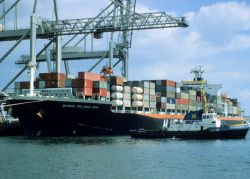Law Analysis
Ship arrest under maritime law
S. M. Mohiuddin Hasan
 |
Photo: Bangladeshchronicle.net |
Arrest of ship is a very special feature of admiralty law. It is a pre-trial remedy critically important to a maritime creditor. Arrest means the detention of a ship by judicial process to secure a maritime claim. The maritime claim under admiralty law generally covers all causes of actions relating to ships and carriage of cargo and may further cover matters ancillary to shipping. The arrest is part of the process by which an Admiralty Court gains jurisdiction over the subject matter of a law suit. The effect of an order of arrest prevents the ship legally from moving or trading unless such order is withdrawn or vacated by the court. In common law countries, a vessel can only be arrested in the limited number of cases where claimants are entitled to enforce their claims in a proceeding in rem. In other words, the action in rem creates the foundation for the right to arrest a ship in such countries. The fundamental legal nature of an action in rem is that it is a proceeding against the res. Thus, when a ship represents such a res, as is frequently the case, the action in rem is against the ship itself. An action in rem is only available in the exercise of admiralty jurisdiction.
The statute structuring admiralty jurisdiction in Bangladesh is the Admiralty Court Act, 2000. The Act declares the High Court Division of the Supreme Court to be the Court of Admiralty [Section 3(1)]. According to section 8 of the Act, the admiralty jurisdiction is to be exercised by a bench of single judge of the High Court Division. Under the Act, a party wishing to arrest a ship in Bangladesh must pass two tests. Firstly, he/she has to satisfy the court that his/her claim falls within one or more of the categories set out in section 3(2) of the Act. Secondly, the claimant must satisfy the court that an action in rem may be brought for such claim. The claim for which an action in rem may be brought is detailed in section 4 of the Act. The section clearly indicates that such action is not confined to ships only and may extend to other property.
All suits pertaining to maritime claims in Bangladesh need not necessarily contain a relief for arresting a foreign vessel and could simply be a suit for recovery of money (commonly known as Money Suit) arising out of a contract of carriage of goods by sea. Thus all maritime claims need not lead to invocation of admiralty jurisdiction in the sense of arresting the offending ship. Such maritime claims which are pure and simple could well be adjudicated by the civil courts as suits of civil nature as there is no express wording in the Act that ousts the jurisdiction of civil courts [Section 9 of the Code of Civil Procedure]. In such suits, an admiralty claimant may invoke attachment as a mechanism for asserting his/her claim and obtain pre-judgment security. The court may, on the application of the plaintiff, pass an order for attaching the vessel before judgement within its jurisdiction [Section 94 (b) and Order 38 Rule 5 of the Code of Civil Procedure]. The distinctive feature of attachment is that, unlike arrest in rem, it is not restricted to maritime property (ships, cargo, freight, bunkers) only, but may also be made against any assets of the defendant located within the jurisdiction of the court seized of the claim. However, pursuant to the judgement given in Unimarine S.A. Panama Vs Bangladesh (1979) 31 DLR 113, ships casually brought within the jurisdiction of the court should not ordinarily be attached before judgement under Order 38 Rule 5 of the Code “unless there are other compelling reasons” to do so. Therefore, it is the discretion of the court to determine what would constitute “compelling reasons” to take action under the above rule.
Apart from arrest, a foreign ship may also be detained while within Bangladeshi jurisdiction under section 490 of the Merchant Shipping Ordinance, 1983 by a Court of Law (Supreme Court). This power may be invoked against a foreign ship that is alleged to have caused damage to property belonging to the Government, or to any citizen of Bangladesh or a company. Though an order of detention also prevents a vessel from moving, the difference between 'Arrest' and 'Detention' of a ship is significant to note. Arrest practically and theoretically is graver than detention. Detention is a condition which the ship endures more frequently during her life. It is less rigorous from arrest, both in cause and effect.
At the international level, arrest of vessels has long been a subject of debate with two international conventions being the outcome. The 1952 Brussels Convention (The International Convention for the Unification of Certain Rules relating to the Arrest of Seagoing Ships) is in force and has been ratified and accessed by over 90 nations. The second convention concerned with arrest is the 1999 Geneva Arrest Convention (International Convention on the Arrest of Ships) which came into force on 14 September 2011. To date, Bangladesh did not sign any of these conventions.
The current position of the law of arrest of ship in Bangladesh points out the urgent need for a comprehensive legislation regarding the matter. The lack of clarity in the laws has lead to situations where the jurisdiction of the court may be tainted with uncertainty. The situation may be addressed either by enacting a separate law establishing uniformity in the field or by formulating a comprehensive code laying down the legal norms governing the different aspects of admiralty. If the status quo concerning arrest legislation continues to exist, Bangladesh may become an unattractive destination for foreign shipping.
The writer is Advocate, Supreme Court of Bangladesh.